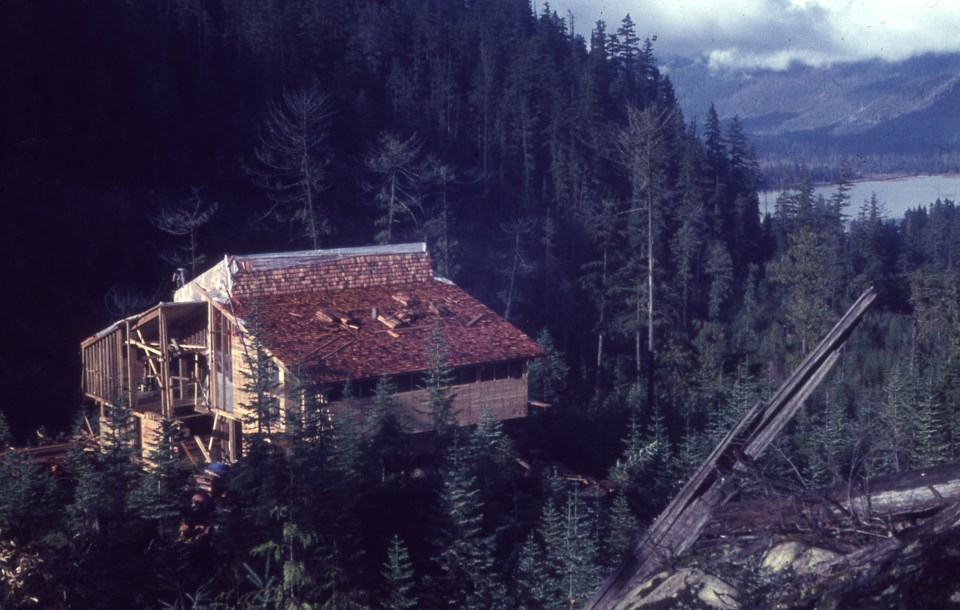Established in 1917, the University of British Columbia’s Varsity Outdoor Club (VOC) set about climbing, hiking and skiing the many mountain ranges surrounding Vancouver. It was only a matter of time before the VOC’s quest for adventure led them onto the slopes of Whistler and the surrounding region.
Prior to the proposal of a new cabin near Whistler, VOC members were already travelling to the Whistler region. During the mid-1950s the VOC’s infamous “long-hike,” a mandatory trek that initiated new members into the club’s ranks, began to be held in the Garibaldi region. Garibaldi Provincial Park was also becoming increasingly popular among VOC members, for its (then) remote location. In 1964, VOC members completed the first successful recorded ascent of the Spearhead Traverse.
Also in that year, the VOC declared its intention to build a new club cabin a short distance from Whistler Mountain. The new location promised to compensate for the inadequacies of the VOC’s Mount Seymour cabin; namely, overcrowding and minimal ski development. Additionally, club members would often return to Vancouver after a day of skiing rather than use the cabin overnight, which the VOC executives cited as diminishing club spirit. Cabin construction in Whistler began in 1964 and was completed by Christmas 1965; for a detailed account of the building process, see previous Whistorical articles “Constructing a Cabin” and “Origins – UBC VOC Lodge” on the Whistler Museum’s website.
Unfortunately, the Whistler cabin developed similar problems that had plagued the older Seymour cabin. Rapid commercial development of Whistler in the early 1970s alienated many members of the VOC, who felt that the location now ran contrary to the club’s ethos. The cabin, rather than being a focal point for VOC outings, was now divisive, as the club’s more hardcore members and those who weren’t interested in downhill skiing saw little reason to utilize the facility. With club spirit divided and maintenance costs rising, something had to be done.
In 1974, an early solution was found in the UBC Ski Club (formed from VOC members). The VOC’s executive team hoped to transfer the management costs of the cabin to the Ski Club, avoiding further financial hardship for the VOC and maintaining club unity. By 1975, the Ski Club offered to purchase the cabin, a proposition viewed favourably by both clubs. This is when UBC’s student government, the Alma Mater Society (AMS), stepped in to block the sale, claiming legal ownership of the cabin. The AMS was also unwilling to facilitate the arrangement between the Ski Club and the VOC. Another agreement was drawn up, only to be shot down by the AMS, on the grounds that it was too favourable for the VOC.
The growing animosity between the VOC and the AMS culminated in the spring of 1975. A final, desperate arrangement, proposed by the VOC and Ski Club, was promptly turned down by the AMS, which restated its claims of ownership to the cabin and that any sale would happen on its terms. In 1977, a legal battle ensued, and the VOC took the AMS to student court. The court ruled that, despite legal ownership, the AMS still had to compensate the VOC for the material and labour cost of the cabin, totalling $30,000. The AMS refused to pay, stating that the student court had exceeded its jurisdiction; the VOC responded in 1979 by threatening the AMS with legal action at the provincial level. Only then did the AMS agree to out-of-court negotiations, and paid out the $30,000.
Despite a legal victory, the VOC lost its taste for club cabins, and the Whistler cabin was the last of its kind. With its hard-earned assets, the VOC instead invested in three new mountaineering huts. The AMS sold the Whistler cabin in 2014, and it now serves as an independent hostel in Nordic.




